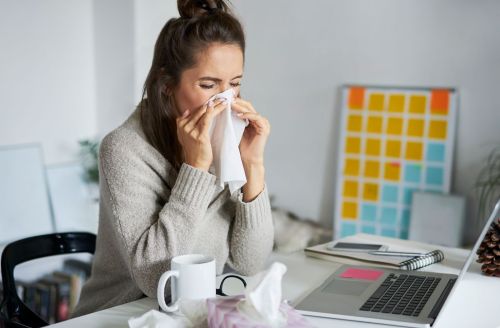Seasonal allergies are the worst. Your eyes are red, your nose is runny, and—worst of all—you’re sneezing 24/7. So, you grab your go-to antihistamine to help relieve those symptoms. But when is the best time to take allergy meds for maximum effectiveness? Experts share more about allergy medication timing here.
Experts in This Article
allergist, immunologist, and medical advisor with the Allergy &
allergy and immunology specialist at Allergy and Asthma Center of NC
The best time of day to take allergy meds
Most people don’t pop allergy pills until they’re already dragging through their morning. That’s why experts say you should actually try to take your antihistamines before you go to bed at night.
“Antihistamines take at least 30 minutes to work, and the newer, long-acting ones will last you 24 hours, so you’ll be covered until the next day. They work best when they’re already in your system, so the night before is most efficacious,” says Purvi Parikh, MD, an allergist, immunologist, and medical advisor with the Allergy & Asthma Network. “Because some antihistamines make you drowsy, it’s actually best to take them before bedtime.”
An added bonus: Taking them ahead of time means you’ll rise just in time for them to reach their prime allergy-fighting zone. “Once-daily antihistamines reach their peak efficacy 8 to 12 hours after you take them, so using them at dinnertime or before bed means better control of your daytime symptoms,” says Yoon Mi Kim, DO, an allergy and immunology specialist at Allergy and Asthma Center of NC.
As long as you’re consistent and try to take your meds prior to exposure, Dr. Parikh says any time will work. But for anyone who dreams of waking up without the sniffles, you can’t beat swallowing the pill before you get ready for some shut-eye. (And then save your mornings for a dose of coffee to help with seasonal allergy symptoms.)
When to start taking allergy meds
The timing of when allergies kick in and when to start meds can be confusing. According to the Allergies and Asthma Network, it’s better to start taking allergy meds as a preventative measure—that means before allergy season is in full swing.
Allergists recommend you start your meds two to four weeks before your allergy season begins. Seasonal allergies of course will depend on where you live. For many regions in the U.S., spring allergies start in February and can last until early summer, per the American College of Allergy, Asthma & Immunology. And fall allergies typically begin in August and last through November.
Types of allergy medications
When it comes to the type of allergy medications out there, you’ve got options. They come in the form of pills, nasal sprays, liquids, inhalers, eye drops, topicals, and even injections. Many are also available over-the-counter (OTC), but some do require a prescription from a doctor. Here’s a breakdown of each:
Antihistamines
Antihistamines are the most common allergy medication. They’re an OTC option that fights allergy symptoms like itching and stuffiness, per the Cleveland Clinic. Antihistamines can be taken every day and are readily available—you’ve probably heard of brands like Zyrtec, Allegra, Claritin, etc. Dosing depends on the medication you choose. Some are fast-acting and can last all day, while others may need to be taken multiple times a day.
Just keep in mind: Some first-generation antihistamines (like Benadryl) can make you sleepy, so if you’ve got a busy day, consider finding a non-drowsy selection. Most second-generation antihistamines, like Claritin or Allegra, don’t make you drowsy, per the Cleveland Clinic.
Decongestants
As the name suggests, decongestants help congestion—i.e., that dreaded stuffy nose feeling when allergies hit. According to the Cleveland Clinic, decongestants work by constricting blood vessels in the nose, which helps open up airways. Unlike antihistamines, decongestants should not be used every single day—only on your most difficult allergy days.
You should also limit your decongestant use to no more than 10 to 14 days at a time. Decongestants can cause side effects like increased heart rate and elevated blood pressure, so they’re not a great long-term solution, per the Cleveland Clinic.
Nasal sprays
Nasal sprays are the perfect on-the-go option. Plus, they work just as well as other medications to reduce nose inflammation. While most saline-based sprays are safe to use every day (and in the weeks prior to allergy season, per the Cleveland Clinic), the kinds advertised as decongestant sprays (like Afrin) can be habit-forming and can cause something called rebound congestion if you use them for too long, per Houston Methodist. This is why it’s best not to use them more than three days in a row.
There are also nasal steroid sprays available over the counter (like Flonase and Nasonex), which need to be used regularly, according to the American Academy Of Otolaryngic Allergy (AAOA).
If you’re unsure about which type of nasal spray to use, and how long you can use it for, talk to your doctor. In the meantime, try to stick to the saline-based stuff as you prep for allergy season.
Eye drops
Itchy, watery eyes are just the worst. That’s where eye drops come in. They can help relieve eye-allergy symptoms like redness, swelling, and burning, per the ENT and Allergy Specialists. You can get eye drops over-the-counter or in prescription form from your doctor. But keep in mind, these aren’t a long-term solution. While artificial tears may be okay, OTC decongestant eye drops (i.e., those advertised for “red eye”) may actually worsen your symptoms over time, per the ACAAI. For that reason, they shouldn’t be used for longer than a week.
TIP
Because some allergy meds (either OTC or prescription) can only be taken for certain lengths of time, it’s best to chat with your doctor before you start taking anything, to figure out which kind is right for you—especially if you’re also managing an underlying health condition.
Other ways to combat allergy symptoms
If allergy medications alone aren’t doing the trick, there are other ways to fight off the peskiest of allergy symptoms. Everyday changes can be made to reduce your exposure to certain triggers, including the following, according to the Mayo Clinic:
- Staying indoors on high-allergen days
- Sipping tea for allergy symptoms, like a sore throat
- Changing out of the clothes you wore outside when indoors
- Showering at night to remove allergens from skin and hair
- Closing doors and windows at night
- Getting an air purifier to clear the air in your home
- Using a hypoallergenic mattress topper to minimize allergy symptoms at night
When to see a doctor about allergy symptoms
If the above medication options and lifestyle changes don’t ease up your allergy symptoms, and your itchy, watery eyes and runny nose are interfering with your ability to function, it may be time to see your doctor or an allergist. They can help rule out possible causes, and make sure you’re not dealing with any severe allergic reactions (aka, anaphylaxis). Call your doctor and seek emergency medical care if you have any of the following allergy symptoms, per the Allergies and Asthma Network:
- Irritated skin
- An itchy mouth or swollen tongue
- A stomachache
- Shortness of breath
- Coughing or choking
- Confusion
Your doctor may also take next steps to identify your allergens (through blood work or a skin prick test) to find the best treatment for you. Treatments may include oral medications or allergy shots—i.e., regular injections that expose you to allergens in small doses, to help your build tolerance over time. These can be especially helpful if you want to build up immunity to dog allergies or even some food allergies, for example.
FAQ
Should you take allergy medicine every day?
This will depend on the type of medication you reach for. While antihistamines like Claritin are generally safe for everyday use, decongestants like Zyrtec-D or Allegra-D are likely not. Nasal sprays with the ingredients oxymetazoline or phenylephrine can cause a rebound congestion if used for longer than three days in a row, per Houston Methodist. If a medication is considered habit-forming or has side effects that can have long-term effects on your health, their use should be limited. If you’re unsure about which types of medicines can be taken every day, talk to your doctor.
How much antihistamine can you take in 24 hours?
The amount you take will depend on the strength of the antihistamine, per the Mayo Clinic. Your best bet? Read the medication’s label for dosage instructions and/or talk to your doctor before taking it, to ensure you’re taking the right dose.
Is it better to take allergy medicine before or after eating?
Allergy medicine can be taken with or without food. But if you’re particularly worried about getting a stomachache, you can take the medicine with food or a drink to reduce any irritation, per the Mayo Clinic.
When should antihistamines be avoided?
You may have to avoid antihistamines if you have certain chronic health conditions like high blood pressure. Taking antihistamines with high blood pressure medications may elevate your heart rate and blood pressure, per the Cleveland Clinic. If you have an underlying health condition or take certain medications that may negatively interact with antihistamines, talk to your doctor to discuss other allergy treatment options. Another bad combo? Antihistamines and alcohol. Side effects can be excessive drowsiness, dizziness, headaches, and increased risk of injury.
—reviewed by Jennifer Gilbert, MD, MPH
Sign Up for Our Daily Newsletter
Get all the latest in wellness, trends, food, fitness, beauty, and more delivered right to your inbox.
Got it, you've been added to our email list.











